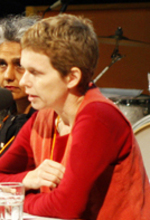Chine in the West
The Chinese-German Academy of Arts, at which I work as a lecturer, cultural educator and translator, is a joint project between the China Academy of Art in Hangzhou (PeopleÂ’s Republic of China) and the Berlin University of the Arts. This intercultural academy offers students from China the opportunity to obtain a masterÂ’s degree in liberal art or design.
In teaching sessions, the majority of which are conducted by German lecturers, the staff are mostly German and the students mostly Chinese. This arrangement therefore in some ways reflects an existing geopolitical imbalance: the underlying problem which, though it does not normally break the surface, is a latent presence within the partnership.
Both students and teachers adopt a fundamentally open approach to each other, so that interpersonal contact initially overrides all cultural and geopolitical differences. To that extent, it appears to bear out the Confucian saying that “all people are close in their essence but distant in their habits.”
In the daily course of teaching, however, we encounter fundamental differences, especially in terms of mentalities. On the German side, for example, thinking seems to be geared closely to the present and to the western hemisphere, while the Chinese invariably focus on the relationship between tradition and modernity, east and west.
New students, for instance, are often disappointed in their expectation that they will learn what German culture is all about. Questions such as “Could you tell us something about the concept of aesthetics in Germany?” generally fail to elicit a response, and students don’t understand why German lecturers are unable to convey the particular features of their culture. At this stage, it needs to be pointed out that such overarching questions are not appropriate, possibly because most people in the west are unaccustomed to viewing their cultural background from the outside, and thus do not, like the Chinese, see themselves in relation to a fundamentally different cultural system.
Within the western cultural sphere, we tend to see ourselves as “citizens of the world”, and we won’t admit to any conscious feeling of superiority over other cultures – the fact of supremacy blurs the differences. Those differences only become tangible when they have an adverse impact on us – when we are on the wrong side. In the early 90s, a Chinese student at the art academy sarcastically observed that “You people in the west just believe that the world belongs to you. And as for us – we also believe the world belongs to you.”
Given such fundamental differences and misunderstandings, how can we possibly achieve mutual comprehension? In my personal experience this is a process that takes years, passing from bafflement, via speculation, to incipient understanding and only then to direct or intuitive comprehension. The process of learning to understand must ultimately lead to a transformation of oneÂ’s own personality, and can in extreme cases lead to personal assimilation. A purely intellectual understanding is essentially inadequate: rather we must, through a constant process of learning, repeatedly learn to sense the differences and integrate them into our own personal perception.
In a Chinese environment, we often encounter situations or ways of behaving that we are unable to understand, for instance when we notice that someone is lying to us. This leaves an unpleasant taste in our mouths, and we give way to speculation. An American friend of mine, for example, complained about the Chinese that “It’s a disgrace the way they always lie!” During a journey through China, one German film director concluded that “They don’t want to tell us the truth for political reasons.” But if we are curious and open enough to move beyond the initial answers, we may gain further information that gives us a more sophisticated understanding – for instance of the fact that in China, certain lies are viewed not as morally reprehensible, but rather as legitimate excuses to save face. Constant experience and observation then reveal which lies are regarded as legitimate in a given situation and which are not. Increasing personal contact ultimately reveals what kinds of people or social groups tend to “lie” more, and which less. A lie is a lie is a lie. The same is true of many other concepts, including everyday ones such as “friendship”, “individuality”, “morality” and “love”, or political hot potatoes such as “human rights”, “freedom of expression” and “democracy”. Our understanding of a given term is the same, and yet not the same. Whether and how we can deal with differing attitudes depends largely on our personal capacity for mutual tolerance. Equally crucial is the question whether we are willing to approach each other without preconceptions and to listen to each other.
The process of learning to understand is a great opportunity to realize that misunderstandings are just that – misunderstandings – and then learn how to deal with them. Given that China’s increasing economic ascendance is beginning to level out the geopolitical imbalance with the west, our encounter with Chinese culture is at the beginning of a process of mutual understanding. Finally, we have the chance to identify our mutual misunderstandings on a basis of equality.
(Translated by Geoff Spearing)


